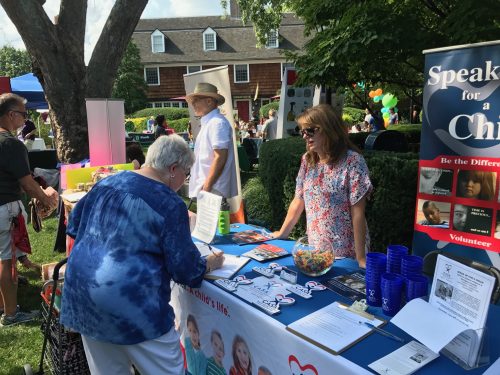Exactly What Does A CASA Volunteer Do?
CASA has been best described as the “eyes and ears” of the court and often acts as the “arms and legs” of an overworked child protective system. From helping siblings find permanent homes together, to helping a child access needed services, to uncovering information that helps reunite a loving family, volunteer advocates make an incredible difference to the lives of abused and neglected children. As a system, CASA provides significant cost savings to the tax payer by ensuring children are placed in the most appropriate home possible and as quickly as possible.
CASA volunteers are appointed by the Family Court Judge to advocate for the best interests of abused and neglected children. The primary responsibilities of a CASA volunteer are to:
- Gather Information: Review documents and records, interview the children, family members and professionals in their lives.
- Court Reports: Provide written reports to the court in preparation for all court proceedings.
- Attend Court: Advocate for the child’s best interests.
- Be the “Safety Net”: Seek cooperative solutions among individuals and organizations involved in the children’s lives.
- Recommend Services: Ensure that the children are receiving appropriate services by keeping the parties involved informed of any needs currently not being addressed. Bring concerns about the child’s health, education, mental health, etc., to the court’s immediate attention.
- Monitor Case Plans and Court Orders: Assist the Court by reporting any deviation from what the court has ordered for the life of the case.
- Visit with the Child: Maintain a consistent and regular visiting schedule with the child, on at least a monthly basis.
- Attend meetings to advocate for the child: Represent the child in meetings with schools, counselors, and other professionals.
Who Can Be A Volunteer?
Anyone who meets the following criteria is eligible to train as a CASA volunteer. Final selection is at the discretion of the CASA program.
 Must be at least 21 years of age
Must be at least 21 years of age- Must have the ability to communicate effectively, both orally and in writing to prepare court reports and communicate with professionals
- Give a minimum 12 month commitment once assigned
- Willing to donate 5-20 hours of service per month
- Complete a 33 hour training course
- Pass a background check including criminal, child abuse registry, sexual offender registry, and references
- Must possess mature judgment, high degree of responsibility and sufficient time to serve the best interest of the child
- Must be able to relate to persons of different cultures, ethnic backgrounds and socioeconomic status
- Must have lived in the United States for the past seven years (for background check purposes)
- Must have reliable access to a car in order to maintain monthly visits and attend meetings and court.
What Is A CASA Volunteer?
A Court Appointed Special Advocate (CASA) volunteer is a trained citizen appointed by a judge to represent a child victim in a case of abuse and neglect.
What Training Does A CASA Volunteer Receive?
CASA volunteers receive a combined total of 30 hours of in-person, or as is the case during Covid, virtual training. After the training in complete, the CASAs are sworn in by the family court judge and conclude their training with a mandatory 3-hour courtroom observation. Volunteers are also required to fulfill 12 hours of in-service training per year.
What Is The CASA Philosophy?
The CASA concept is based on the fact that every child has the right to a safe, permanent home. A juvenile court judge appoints a volunteer to the child’s case. The volunteer then becomes an official part of the judicial proceedings, working alongside attorneys and social workers as an appointed officer of the court. However, unlike attorneys and social workers, the CASA volunteer speaks exclusively for the child’s best interests. By handling only one or two cases at a time, the CASA volunteer has time to thoroughly explore the history of each assigned case. CASA is the only program in New Jersey where volunteers are appointed by the court to advocate on behalf of an abused or neglected child.
What A CASA Does
English
CASA volunteers are appointed by the Family Court to conduct independent fact finding investigations and formulate recommendations to help the Court achieve the best possible outcome for an abused or neglected child’s future.
Upon appointment to a case, the CASA volunteer conducts an independent investigation that includes reviewing any/all records, researching information and talking to everyone involved in the child’s life, including social workers, attorneys, DCP&P workers, parents, teachers, family members, medical and mental healthcare providers, and of course, the children themselves. Based on the information found, the CASA volunteer will make recommendations to the Family Court on behalf of the best interest of the child. In addition, there are a number of other things that CASAs do to help move the case towards a positive outcome:
- Visit the child and family at least one time a month
- Attend appointments, intakes, IEP meetings, court, etc.
- Participate in case management conferences
- Talk to all interested parties and facilitate more effective and efficient communication
- Monitor compliance with Court Orders and DCP&P plans
- Assist in overcoming obstacles to compliance with Court Orders and DCP&P plans
- Request services on child’s/families’ behalf (e.g., Early Intervention)
- Provide both biological and foster families with information on local social service agencies and assist these families to the extent that such assistance serve the best interests of the child
- Follow up with parents to make sure appointments are kept and the families follow through with recommended services
While there is much that we can do to help facilitate both stability and permanency for children in placement, there are some things we cannot do. These limitations include:
- Transporting children and family members
- Signing consent papers on child’s behalf (i.e. IEP, authorization for surgery)
- Supervising visitation (participating in visitation is allowed though)
- Implementation of services
- Releasing personal information including phone numbers and addresses of foster/birth families
- Providing legal or therapeutic advice (regardless of whether the particular volunteer is a lawyer or therapist)
- Asking the children directly about the abuse and neglect they might have suffered
- Sharing information with anyone other than those involved in or recognized by the Court as being part of the individuals case
CASA volunteers are in a unique position to perform a tremendous service on behalf of children in foster care and help to promote stability, interventions, and permanency on their behalf. These advocates can be an important resource to Family Court Judges, DCP&P, law guardians and families throughout the State of New Jersey.
Spanish
Los voluntarios de CASA (Abogado Especial Designado por la Corte) son nombrados por un Juez para descubrir el mejor resultado posible para el futuro de un niño abusado o descuidado. El objetivo del voluntario CASA es ver que cada uno de estos niños sea colocado en un hogar seguro y permanente y proporcionar esperanza para una vida mejor. Voluntarios de CASA, después de haber sido entrenados durante más de 30 horas, llevan a cabo una investigación independiente de búsqueda de hechos revisando registros, investigando información y hablando con todos los trabajadores sociales involucrados, abogados, trabajadores de DCP&P, padres, maestros, miembros y, por supuesto, los propios niños. Después de este proceso, los voluntarios de CASA hacen recomendaciones al Tribunal de Familia para promover el mejor interés del niño. Incluso con un año de compromiso, la mayoría de los voluntarios permanecen hasta que el caso se resuelve. COSAS QUE NO PODEMOS HACER:
- Visitas no anunciadas
- Transporte a niños y familiares
- Firmar documentos en nombre del niño (es decir, IEP, autorización para la cirugía)
- Proporcionar visitas supervisadas
- Hacer la mayoría de las referencias que necesitan la aprobación de DCP&P (es decir, consejería de medicamentos)
- Aunque hacemos un informe, los voluntarios de CASA no tienen posición en la corte
- Divulgan información personal incluyendo números de teléfono y direcciones de familias de crianza/nacimiento
- Proporcionar el consejo legal o tomar el lugar de un terapeuta
- Pregunte a los niños directamente sobre el abuso y negligencia que podrían haber sufrido o investigar nuevos reclamos de abuso y / o negligencia
- Compartir información con cualquier persona que no sea la reconocida por el tribunal.
COSAS QUE PODEMOS HACER PARA AYUDAR:
- Facilite una resolución más suave y rápida a la situación actual
- Visite a los niños y a la familia al menos una vez al mes
- Acompañar a la cita del médico, las ingestas, las reuniones del IEP y la corte
- Participar en conferencias de gestión de casos, revisión de colocación de niños y reuniones de la junta
- Facilitar una mejor comunicación hablando con todas las partes interesadas Solicitud de servicios en los programas de niños/familias (es decir, Intervención Temprana, Programa de Firewatch, programas después de la escuela)
- Investigar y enviar información a las familias sobre temas de interés (es decir, discapacidades de aprendizaje, KLG)
- Ayudar en las colocaciones, incluyendo hablar con los miembros de la familia y/o posibles cuidadores
- Proporcionar a las familias información sobre las agencias locales de servicios sociales, como asistencia legal, bancos de alimentos comunitarios, centros de salud locales
- Haga un seguimiento con los padres para asegurarse de que se cumplan las citas y que las familias sigan con los servicios recomendados
- Anime a los padres y a los niños a abogar por sí mismos
- Proporcionar una sensación de apoyo a los niños y las familias.
How Does A CASA Volunteer Investigate A Case?
To prepare a recommendation, the CASA volunteer talks with the child, parents, family members, DCPP case workers, school officials, health providers, and others who are knowledgeable about the child’s history. The CASA volunteer also reviews all records pertaining to the child – school, medical, case worker reports, and other pertinent documents.
How Long Does A CASA Volunteer Remain Involved With A Case?
Our CASA program requires a minimum of a one-year commitment with the ultimate goal of the volunteer continuing until the case is permanently resolved and permanency has been achieved. One of the primary benefits of the CASA program is that, unlike other court principals who often rotate cases, the CASA volunteer is a consistent figure in the proceedings and provides continuity for a child.
How Much Time Does It Require?
Each case is different. A CASA volunteer usually spends about 15 hours a month doing research and conducting interviews prior to the first court appearance. More complicated cases take longer. Once initiated into the system, volunteer advocates work anywhere, on average from 5- 20 hours per month depending on the complexity of the case to which they are assigned.
How Are CASA Programs Funded?
CASA programs depend on their communities to support them. Foundations, corporations, fundraising events, annual giving, and grants are just some examples of the ongoing support received by local CASA programs.
How Effective Have CASA Programs Been?
Research suggests that children who have been assigned CASA volunteers are half as likely to re-enter foster care and are significantly less likely to spend time in long-term foster care. A child with a CASA volunteer is also more likely to do better in school, have better conduct, and more likely to find a permanent home.
